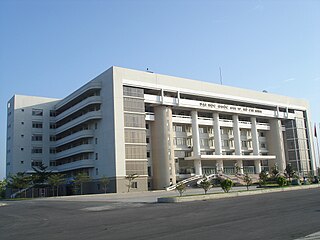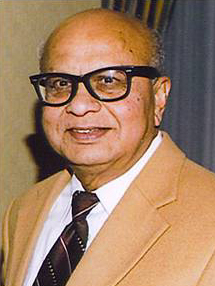
Environmental science is an interdisciplinary academic field that integrates physics, biology, and geography to the study of the environment, and the solution of environmental problems. Environmental science emerged from the fields of natural history and medicine during the Enlightenment. Today it provides an integrated, quantitative, and interdisciplinary approach to the study of environmental systems.
A Bachelor of Engineering or Bachelor of Science in Engineering (BSE) is an undergraduate academic degree awarded to a student after three to five years of studying engineering at an accredited college or university.

Cochin University of Science and Technology (CUSAT) is a state government-owned autonomous university in Kochi, Kerala, India. It was founded in 1971 and has three campuses: two in Kochi and one in Kuttanad, Alappuzha, 66 km (41 mi) inland. The university awards degrees in engineering and science at the undergraduate, postgraduate and doctoral levels.

King Mongkut's Institute of Technology Ladkrabang is a research and educational institution in Thailand. It is situated in Lat Krabang District, Bangkok approximately 30 km east of the city center. The university consists of nine faculties: engineering, architecture, science, industrial education and technology, agricultural technology, information technology, food industry, liberal arts, and medicine.
John Nelson Warfield was an American systems scientist, who was professor and director of the Institute for Advanced Study in the Integrative Sciences (IASIS) at George Mason University, and president of the Systems, Man, and Cybernetics Society.
Earth systems engineering and management (ESEM) is a discipline used to analyze, design, engineer and manage complex environmental systems. It entails a wide range of subject areas including anthropology, engineering, environmental science, ethics and philosophy. At its core, ESEM looks to "rationally design and manage coupled human–natural systems in a highly integrated and ethical fashion". ESEM is a newly emerging area of study that has taken root at the University of Virginia, Cornell and other universities throughout the United States, and at the Centre for Earth Systems Engineering Research (CESER) at Newcastle University in the United Kingdom. Founders of the discipline are Braden Allenby and Michael Gorman.
Ecotechnology is an applied science that seeks to fulfill human needs while causing minimal ecological disruption, by harnessing and manipulating natural forces to leverage their beneficial effects. Ecotechnology integrates two fields of study: the 'ecology of technics' and the 'technics of ecology,' requiring an understanding of the structures and processes of ecosystems and societies. All sustainable engineering that can reduce damage to ecosystems, adopt ecology as a fundamental basis, and ensure conservation of biodiversity and sustainable development may be considered as forms of ecotechnology.

The President's Council of Advisors on Science and Technology (PCAST) is a council, chartered in each administration with a broad mandate to advise the president of the United States on science and technology. The current PCAST was established by Executive Order 13226 on September 30, 2001, by George W. Bush, was re-chartered by Barack Obama's April 21, 2010, Executive Order 13539, by Donald Trump's October 22, 2019, Executive Order 13895, and by Joe Biden's February 1, 2021, Executive Order 14007.
Jeonbuk National University is one of ten Flagship Korean National Universities founded in 1947, located in Jeonju, South Korea. Jeonbuk National University has been ranked 551–560th in the world by QS Top Universities Ranking in 2023.

Vietnam National University, Ho Chi Minh City is a public research university system in Ho Chi Minh City, Vietnam. VNU-HCM is one of two Vietnam's national universities, the other one being Vietnam National University, Hanoi.
This page is an index of sustainability articles.
Marian Ruth Chertow is an American academic specializing in environmental management.
Environmental informatics is the science of information applied to environmental science. As such, it provides the information processing and communication infrastructure to the interdisciplinary field of environmental sciences aiming at data, information and knowledge integration, the application of computational intelligence to environmental data as well as the identification of environmental impacts of information technology. The UK Natural Environment Research Council defines environmental informatics as the "research and system development focusing on the environmental sciences relating to the creation, collection, storage, processing, modelling, interpretation, display and dissemination of data and information." Kostas Karatzas defined environmental informatics as the "creation of a new 'knowledge-paradigm' towards serving environmental management needs." Karatzas argued further that environmental informatics "is an integrator of science, methods and techniques and not just the result of using information and software technology methods and tools for serving environmental engineering needs."
North American collegiate sustainability programs are institutions of higher education in the United States, Mexico, and Canada that have majors and/or minors dedicated to the subject of sustainability. Sustainability as a major and minor is spreading to more and more colleges as the need for humanity to adopt a more sustainable lifestyle becomes increasingly apparent with the onset of global warming. The majors and minors listed here cover a wide array of sustainability aspects from business to construction to agriculture to simply the study of sustainability itself.
Earth system governance is a recently developed paradigm that builds on earlier notions of environmental policy and nature conservation, but puts these into the broader context of human-induced transformations of the entire earth system.

Bimal Kumar Bose, also known as B. K. Bose, is an electrical engineer, artificial intelligence researcher, scientist, educator, and currently a professor emeritus of power electronics in the Department of Electrical Engineering and Computer Science at the University of Tennessee, Knoxville.

Carl Folke, is a trans-disciplinary environmental scientist and a member of the Royal Swedish Academy of Sciences. He is a specialist in economics, resilience, and social-ecological systems, viewing such systems as intertwined and potentially unexpected in their interactions. As a framework for resource management, this perspective brings important insights to environmental management, urban planning, and climate adaptation. He suggests ways to improve our ability to understand complex social-ecological interactions, deal with change, and build resilience, often working at smaller scales as a step towards addressing larger scales.
Mark Dehong Xu is a Professor and Director of Power Electronics Institute at the National Engineering Research Center of Applied Power Electronics in Zhejiang University, China.
Diana J. Knight Bendz is an American polymer scientist and environmental and industrial engineer who has promoted environmentally-conscious manufacturing processes in her work at IBM, and promoted the participation of women and girls in science, technology, engineering, and mathematics.







